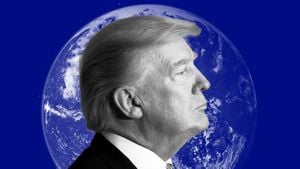Donald Trump’s return to the political forefront following his election victory has raised eyebrows not only within the U.S. but across the globe. His claims to be able to resolve the Ukraine war swiftly have left many shocked, especially since they come on the heels of nearly three years of conflict initiated by Russia's invasion. What Trump has suggested is nothing short of ambitious, insisting he could broker peace "in 24 hours." This assertion was met with skepticism by none other than Dmitry Peskov, spokesperson for Vladimir Putin, who described such promises as an "exaggeration."
Yet, it hasn’t stopped speculations about Trump's strategies and intentions once he takes office on January 20, 2025. One of his primary points of contention throughout the campaign has been the financial burden of U.S. military support for Kyiv. Trump has previously indicated he might negotiate support packages with conditions, particularly concerning Ukraine's NATO memberships being delayed for decades. His statements have left many wondering how the dynamics might shift with the U.S. potentially diluting its role as the primary support for Ukraine.
Edgar Bellow, geopolitics professor at NEOMA Business School, aptly points out, "European leaders should prepare for a more unpredictable and potentially less supportive U.S. stance under a Trump administration." The ramifications of his leadership could necessitate Europe stepping up its defense efforts. Many analysts express concern over how Trump's foreign policy might prioritize American interests over global alliances, akin to what he did during his first term.
Trump's claims were notable enough to elicit reactions from across the pond. Ukrainian President Volodymyr Zelenskyy expressed his uncertainty over Trump's plans for Ukraine, noting he was unaware of specific strategies to end the conflict. This assertion echoes the sentiments of many who recognize the importance of American support to the Ukrainian cause—an indispensable lifeline, with the U.S. accounting for approximately 43% of the total military aid provided since the war began.
On the ground, discussions about how to navigate the situation echo like distant thunder. Turkey's President Recep Tayyip Erdogan remarked on the potential for peace if Trump is determined enough. Meanwhile, the Kremlin's congratulatory response to Trump's victory highlights the shifting tides of diplomacy. Putin called Trump "brave" for his approaches following his attempted assassination earlier this year. Interestingly, Putin's willingness to engage with Trump’s plans suggests they might find common ground, amplifying fears of diverging interests between the U.S. and its European allies.
For now, as Ukraine prepares for what could be significant changes, mounting questions loom—What will Trump do concerning sanctions against Russia? Will he maintain military aid or shift the responsibility to European countries? Global leaders are already bracing for what appears to be the beginning of a more complex U.S.-international relationship.
Meanwhile, Russia’s campaign of aggression continues unabated, with both sides entrenched. The war's urgency contrasts starkly with Trump's assertions of easy solutions. The juxtaposition signals potential instability should the two nations' leadership dynamics shift to favor negotiations over military action.
Rumors of Trump's intentions are bolstered with accounts from his inner circle, hinting at plans to freeze the war along existing fronts and perhaps instate demilitarized zones as part of negotiations—concepts many view with skepticism due to their complexity and the longer-term political ramifications associated with such solutions.
Supporters of Ukraine remain watchful, knowing the consequences could ripple across Europe. While discussions focus on what Trump might do, European leaders grappling with their own existential threats wonder if they must fill the gap left by the U.S. The current and potential impacts of these geopolitical shifts underline the fragility of global alliances forged over decades.
This moment marks not just another momentary shift but symbolizes perhaps the start of radical reformation of U.S. foreign policy just as Trump aims to reshape domestic governance. It has become increasingly clear: the globe watches closely, fully aware of the stakes at hand.



